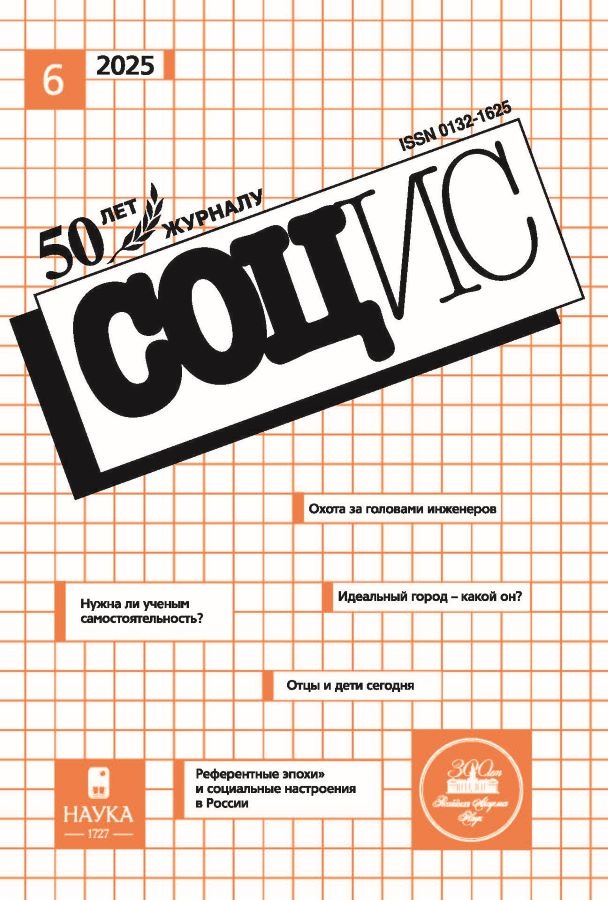Preconception genetic screening in Russians’ assessments
- Autores: Bogomiagkova E.S.1, Orekh E.A.2, Glukhova M.E.2
-
Afiliações:
- Sociological Institute of FCTAS RAS
- St. Petersburg State University
- Edição: Nº 6 (2025)
- Páginas: 129-142
- Seção: SOCIOLOGY OF HEALTH AND MEDICINE
- URL: https://bakhtiniada.ru/0132-1625/article/view/304513
- DOI: https://doi.org/10.31857/S0132162525050113
- ID: 304513
Resumo
The article presents the results of an all-Russian online survey (N = 1,653), conducted in 2024 and devoted to the investigation of the Russians’ attitudes toward predictive genetic testing at the pregnancy-planning stage – preconception carrier screening (PCS). Pregnancy planning is treated as a transforming social institution assimilating new value trends, one of which is the need to control potential risks to the health of future children. In the course of this study, empirical data were collected for the first time in Russia to characterize Russians’ awareness of and willingness to undergo such screening, as well as their experience with the procedure and related concerns. As a result, social factors that increase this willingness were identified, including prior experience with any genetic testing, the presence of chronic diseases, and respondents’ reproductive plans. Moreover, young Russians, along with members of highly educated and high-income groups, are at the peak of these social changes. It was also found that Russians possess limited knowledge about genetic diseases and their patterns of inheritance, which introduces certain caveats into the interpretation of the data obtained. Although predictive practices are gradually reshaping the institution of pregnancy planning, the routinization of PCS in our country remains a matter for the future.
Palavras-chave
Texto integral
Sobre autores
Elena Bogomiagkova
Sociological Institute of FCTAS RAS
Autor responsável pela correspondência
Email: e.bogomyagkova@spbu.ru
Cand. Sci. (Sociol.), Senior Recearcher, Assoc. Prof. Department of Theory and History of Sociology
Rússia, St. PetersburgEkaterina Orekh
St. Petersburg State University
Email: e.orekh@spbu.ru
Cand. Sci. (Sociol.), Assoc. Prof. Department of Theory and History of Sociology
Rússia, St. PetersburgMaria Glukhova
Email: mglukhova@eu.spb.ru
independent researcher
Rússia, Санкт-ПетербургBibliografia
- Baranov V. S., Kuznetsova T. V. (2015) New Possibilities for Genetic Prenatal Diagnostics. Zhurnal akusherstva i zhenskikh bolezney [Journal of Obstetrics and Women’s Diseases]. Vol. 64(2): 4–12. (In Russ.)
- Beck U. (1992) Risk Society: Towards a New Modernity. London: Sage.
- Berger P. L., Luckmann T. (1966) The Social Construction of Reality: A Treatise in the Sociology of Knowledge. Garden City, NY: Anchor Books.
- Bioethics and Genetics: Challenges of the 21st Century. (2024) Ed. by Grebenchikova E. G. Moscow: INION RAN. (In Russ.)
- Bogomiagkova E. S. (2022) Genetic Testing in Health Care Practices (Based on Empirical Research). Meditsinskaya etika [Medical Ethics]. Vol. 10. No. 2: 38–43. (In Russ.)
- Borisov V. A., Sinelnikov A. B., Arkhangelsky V. N. (1997) Abortions and Family Planning in Russia: Legal and Moral Aspects. Voprosy statistiki [Questions of Statistics]. No. 3: 75–81. (In Russ.)
- Borisova A. O., Nesterov R. S. (2023) Sociocultural Aspects of Preconception Genetic Testing. Meditsinskaya etika [Medical Ethics]. Vol. 11. No. 3: 14–21. (In Russ.)
- Fridman H., Yntema H. G. et al. (2021). The landscape of autosomal-recessive pathogenic variants in European populations reveals phenotype-specific effects. Am J Hum Genet. Vol. 108(4): 608–619.
- Gao Z., Waggoner D. et. al. (2015) An estimate of the average number of recessive lethal mutations carried by humans. Genetics. Vol. 199(4): 1243–1254.
- Glotov A. S., Nasykhova Yu. A. et al. (2023) Prospects of Preconception Genetic Screening at the Pregnancy Planning Stage. Zhurnal akusherstva i zhenskikh bolezney [Journal of Obstetrics and Women’s Diseases]. Vol. 72. No. 6: 173–192. (In Russ.)
- Kirichuk Ya.V., Tsarkov S. S. et al. (2019) Determining Russian Students’ Attitudes Towards Genetic Testing and Pharmacogenetic Analysis. Russkiy Meditsinskiy Zhurnal [Russian Medical Journal]. Vol. 27. No. 1–1: 37–40. (In Russ.)
- Makeeva O. A., Markova V. V., Puzyrev V. P. (2009) Public interest and expectations concerning commercial genotyping and genetic risk assessment. Pers. Med. Vol. 6(3): 329–341.
- Nijmeijer S., Conijn T. et al. (2019) Attitudes of the general population towards preconception expanded carrier screening for autosomal recessive disorders including inborn errors of metabolism. Mol Genet Metab. Vol. 126(1): 14–22.
- Ong R., Howting D. et al. (2018) Measuring the impact of genetic knowledge on intentions and attitudes of the community towards expanded preconception carrier screening. Journal of Medical Genetics. Vol. 55(11): 1–9.
- Radzinsky V. E., Pustotina O. A. et al. (2016) Pregravid Preparation: Clinical Protocol. Moscow: Red-ya zhurn. Status Praesens. (In Russ.)
- Revazyan K. Z. et al. (2020) Genetic Screening for Heterozygous Carriage of Mutations Causing Monogenic Recessive Diseases. Profilakticheskaya meditsina [Preventive Medicine]. Vol. 23(6–2): 111–117. (In Russ.)
- Sedova N. N., Navrotskii B. A. (2015) Attitude of Residents of a Large Industrial City Towards Personalized Medicine. Sotsiologiya goroda [Sociology of the City]. No. 3: 39–46. (In Russ.)
- Shekunova Yu.O. (2023) Experience of Applying Preventive Biotechnologies as Part of Caring for Family Members (Based on Empirical Study Results). Izvestiya Saratovskogo un-ta. Novaya seriya. Ser.: Sotsiologiya. Politologiya [Herald of Saratov University. Sociology. Politology]. Vol. 23(3): 294–302. (In Russ.)
- Shekunova Yu.O. (2024) The Process of Geneticization: Institutional Problems of Applying Modern Predictive Biotechnologies in Everyday Life of a Large Russian City. PhD diss. in Sociol. Nizhny Novgorod: NNGU im. N. I. Lobachevskogo. (In Russ.)
- Talantova O. E., Postnikova T. B. et al. (2024) A Modern Perspective on Preconception Screening. Zhurnal akusherstva i zhenskikh bolezney [Journal of Obstetrics and Women’s Diseases]. Vol. 73. No. 1: 149– 156. (In Russ.)
- Tkachenko L. V., Sviridova N. I. (2003) Comprehensive Pregravid Preparation of Women with Recurrent Miscarriage of Infectious‐Inflammatory Etiology. Zhurnal praktikuyushchego vracha akushera-ginekologa [Journal of the Practicing Obstetrician-Gynecologist]. No. 2: 33–35. (In Russ.)
- Zhang F., Shao B. et al. (2021) Current attitudes and preconceptions towards expanded carrier screening in the Eastern Chinese reproductive-aged population. Journal of Assisted Reproduction and Genetics. Vol. 38: 697–707.









